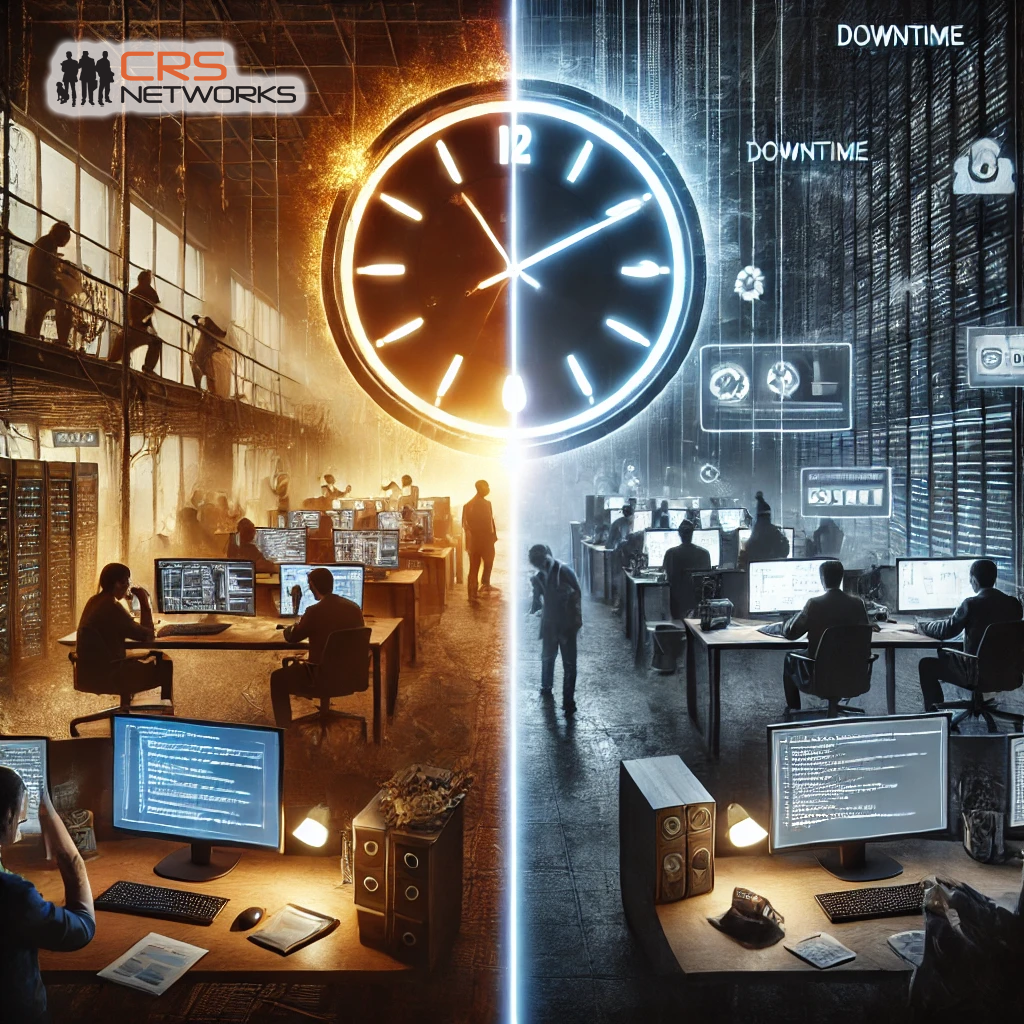In today’s fast-paced digital landscape, businesses depend heavily on their IT infrastructure to operate smoothly. Yet, many companies underestimate the devastating impact that IT downtime can have on their bottom line. From financial losses to reputation damage, downtime can cripple even the most resilient businesses. Here, we’ll explore the hidden costs of downtime, steps you can take to minimize disruptions, and how CRS Networks ensures your business stays operational no matter what.
The Financial Impact of IT Downtime
IT downtime isn’t just an inconvenience; it’s a costly problem that can affect every aspect of a business. According to a study by Gartner, the average cost of IT downtime is around $5,600 per minute, or over $300,000 per hour for larger enterprises. This number encompasses a range of direct and indirect expenses:
- Lost Revenue: When your systems go offline, customers can’t access your products or services, leading to immediate revenue loss.
- Reduced Productivity: Employees are left idle, unable to perform their tasks effectively without access to necessary tools and systems.
- Recovery Costs: Getting systems back online often requires time, resources, and specialized labor.
- Reputation Damage: Customers and clients expect seamless service. Extended downtime can lead to lost trust, canceled contracts, and a damaged brand image.
- Legal and Regulatory Risks: In industries like healthcare and finance, downtime can also lead to non-compliance with legal regulations, adding fines to the growing list of costs.
With these costs in mind, it’s essential to have a strategy in place to prevent and minimize downtime.
Step-by-Step Guide to Minimizing Downtime
- Perform a Risk Assessment
Start by identifying the systems and processes that are critical to your business operations. Evaluate which areas are most vulnerable to failure and calculate the potential costs of downtime for each. - Implement a Backup Strategy
Regular backups are essential to ensure that your data is protected in the event of an outage. Consider both on-site and cloud-based backups for comprehensive protection. Ensure that backups are tested regularly to confirm they can be restored quickly when needed. - Invest in Redundancy
Build redundancy into your systems, such as having multiple servers, power sources, and internet connections. This will allow you to switch to a backup if the primary system fails, ensuring continuous service. - Monitor Systems Continuously
Utilize monitoring software that can detect potential issues before they lead to downtime. CRS Networks provides real-time monitoring services that identify problems early, allowing quick intervention to prevent interruptions. - Create a Disaster Recovery Plan
Develop a robust disaster recovery plan (DRP) that outlines how your business will respond in the event of an emergency. Include clear roles, responsibilities, and communication protocols. Test the DRP regularly to ensure all team members are familiar with the steps. - Partner with a Trusted IT Provider
Collaborating with an IT support partner like CRS Networks ensures your systems are monitored 24/7, giving you peace of mind that potential issues are identified and addressed before they become major problems.
How CRS Networks Ensures Business Continuity
At CRS Networks, we understand the importance of minimizing downtime and ensuring business continuity. Our services are tailored to provide the following benefits:
- Proactive Monitoring: Our team monitors your infrastructure around the clock, identifying and addressing issues before they disrupt your operations.
- Rapid Response: In the event of downtime, our expert technicians are ready to step in and resolve issues quickly, minimizing the duration of interruptions.
- Customizable Solutions: We work with you to design IT solutions that meet your unique needs, whether it’s implementing redundancy measures or creating a disaster recovery plan.
- Cloud-Based Systems: Cloud solutions can further safeguard your business by providing remote access to critical systems and reducing the dependency on physical infrastructure.
By partnering with CRS Networks, your business is equipped with the tools, resources, and expertise to ensure continuity even in the face of unexpected challenges.
IT downtime is a risk that no business can afford to ignore. From lost revenue to reputation damage, the costs can quickly spiral out of control. However, by taking proactive steps—like performing risk assessments, implementing redundancy, and partnering with experts like CRS Networks—you can safeguard your business against these risks. Don’t wait until it’s too late; ensure your business continuity today.
